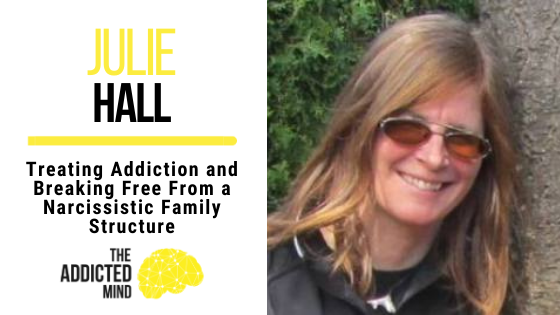A lot of people who come in and seek treatment for addiction are carrying complex trauma from growing up in a narcissistic family structure. And for a lot of people who have grown up in narcissistic families, it can be hard to see the patterns that are there.
Everyone has a level of healthy narcissism. We all see things through our lens to some degree. The narcissist, however, has pathological levels of self-involvement and he or she experiences fundamental developmental deficits early on in life.
On today’s episode, Duane speaks with Julie Hall, author of “The Narcissist In Your Life: Recognizing the Patterns and Learning to Break Free,” to talk about narcissism. Released in December 2019, the book aims to examine narcissistic personality disorder and how it affects the people close to a narcissist. Julie does an excellent job of breaking it down and pulling the pieces apart so people will have more clarity around this type of disorder.
An educational writer, poet, and journalist, Julie comes from a narcissistic family as well. While working on her memoirs, she came to realize that narcissism had been a major theme throughout her life, so she shifted gears and began to write specifically about narcissism. This became part of Julie’s healing process.
Julie has a popular blog called The Narcissist Family Files, and you can find the articles that she writes regularly in Psychology Today. She also has articles in The HuffPost and various other places on the internet.
Addiction is a huge part of the narcissistic family system. There is a pattern of depression, anger, confusion with family rifts, and alienation, and there is no awareness of what the core issue is.
Therefore, education is important for people who grew up with narcissistic parents or for people who find themselves in a narcissistic relationship. They have to untangle themselves from the confusing web they’ve been caught up in because it can be so confusing. Otherwise, they turn into this denial mechanism and eventually fall into the roles of caretaking, codependency, perfectionism, and self-sabotage. It’s also important to get therapeutic help but you have to be careful about choosing a therapist.
In this episode, you will hear:
- What motivated Julie to write the book
- The narcissistic family
- The traits of a narcissist
- Addiction and narcissism
- Coming out of the denial mechanism
- Why you need to be careful when seeking a therapist
- The importance of educating yourself about narcissistic personality disorder
Key Quotes:
[03:14] – “There are differences unique to a narcissistic family as opposed to an alcoholic family or an addicted family.”
[13:23] – “Addiction is a huge part of this whole narcissistic family system… people coming out of families like this are dysregulated themselves, and they are carrying complex trauma.”
[16:20] – “The first step is coming out of denial, taking a hard look at that origin family and those parents, and being willing to acknowledge the ways in which they hurt us and couldn’t love us.”
[17:26] – “Some have had a series of failures with therapists who didn’t understand the realities, narcissistic abuse, trauma, what that looks like and what that feels like.”
[17:41] – “The narcissistic personality will not take responsibility for their behavior. They will not self-reflect. They will not acknowledge fault or flaw, or any kind of behavior that hurts other people, and they don’t have that empathy. They don’t care.”
[20:49] – “The narcissist is really operating with different rules, there’s a different playbook. And it’s important to recognize that and be aware of that to protect ourselves. It’s a grieving process.”
[21:29] – “Children who grow up in narcissistic families have the same brain scan as war veterans.”
Subscribe and Review
Have you subscribed to our podcast? We’d love for you to subscribe if you haven’t yet.
We’d love it even more if you could drop a review or 5-star rating over on Apple Podcasts. Simply select “Ratings and Reviews” and “Write a Review” then a quick line with your favorite part of the episode. It only takes a second and it helps spread the word about the podcast.
If you really enjoyed this episode, we’ve created a PDF that has all of the key information for you from the episode. Just fill in your information below to download it.

